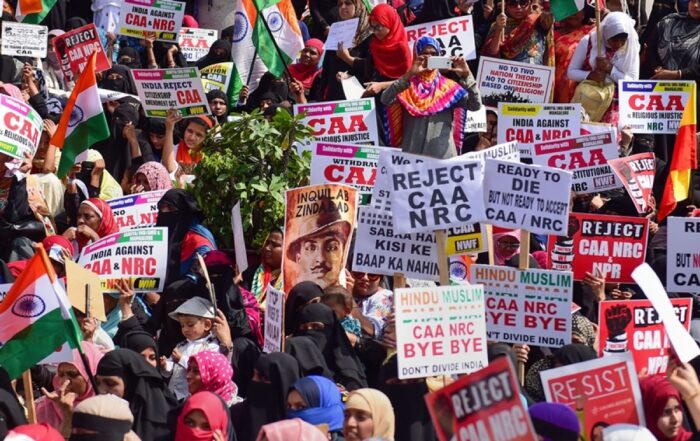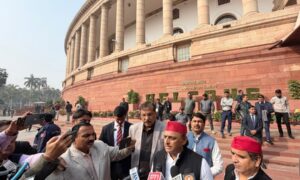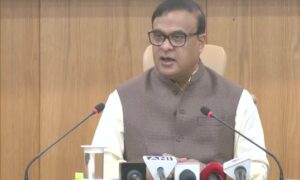
Image : Representational Purpose Only
The report that the Ministry of Home affairs has issued a notification under the Rules made under the Citizenship Act 1955 asking non Muslim refugees from Afghanistan Pakistan and Bangladesh residing in 13 Districts of Gujarat, Rajasthan, Punjab, Haryana and Chhattisgarh to apply for citizenship has predictably caused protests in some parts of Assam as it came as a surprise move soon after BJP’s clear victory in the Assam election and seen as a firm step to grant citizenship to the Bengali Hindu migrants and that it could be done within the existing 1955 Citizenship Law.
Surprise is more because this order is not connected with the contentious 2019 Citizenship Amendment Act which several Assamese political parties, Civil society groups and students Unions opposed vehemently and continue to do so. It may be mentioned that quite some time back a notification granting a kind of amnesty to the aforementioned non Muslim refugees who sought shelter in India on or before Dec 31 2014 was already issued by the Ministry of Home prior to moving the amendment to the 1955 Citizenship Act which didn’t go unnoticed in Assam. However since the Rules under the the 2019 CAA act have not yet been notified there has been a feeling that Implementation will not take place soon at least in Assam because of the unresolved issues of the National Register of Citizenship – NRC as released on August 31, 2019.
It is this hope which has been belied now as this move on the part of the MHA – to initiate the process of grant of Citizenship under the existing 1955 Act Is seen as the advance step towards implementation of the CAA that the PM Modi and the BJP leadership declared as central to their political agenda.
However critically examined , this might raise uncomfortable questions such as to the very need of amendment to the Citizenship Act 1955 Act if the existing provisions are adequate for the purpose of granting citizenship to ” persecuted religious minorities” listed in the CAA 2019 – Hindus,Sikhs, Buddhists,Jains and Christians who meet the minimum” residency qualification of 15 years of stay in India for “naturalization” for Indian citizenship under the Citizenship Rules 2009. The aforementioned notification of the MHA has also conferred powers on the District Magistrates and Collectors and the Home Secretaries of the respective States to cause due enquiries and diligence into the applications for citizenship submitted by the ” persecuted religious minorities” and to grant citizenship on being satisfied with the reports and under intimation to the Ministry of Home affairs. It is further reported that with this order the total no of Districts where such ” naturalization” facility is available to the “persecuted minorities “has gone up from 16 in 2016 to 29 Districts in 9 states.
Unfortunately a dispassionate analysis of the issue of the ” persecuted refugees” has not taken place mainly because it has not been contextualised and parties have taken positions from their own narrow perspectives. For example implicit in the 1950 Nehru Liaquat Pact which covered only Eastern India was an assumption that because of commitments made by India and Pakistan to maintain communal peace in their own areas there would be no further exodus of Hindus from East Pakistan nor Muslims from Indian States of West Bengal and Assam to Pak. Dr. Syama Prasad Mookerjee who later founded Jansangh, the forerunner of the BJP and KC. Neogy , a stalwart from Bengal resigned from the Nehru cabinet on this issue as they felt- and subsequent development proved that they were correct – that the Pact not only abandoned the Hindus and Buddhists of East Pakistan to the mercy of the Pakistanis but also indirectly obstructed their move to India by putting them in the category of ” displaced persons” and not” refugees” meaning persons who might return to East Pakistan. This was apparent even before the proverbial ink used ? was dried as the exodus of Hindus went on unabated while Muslims of East Pakistan Districts bordering Assam began entering into Assam on a big taking advantage of the fact that West Assam Districts had a large Bengali Muslim population already which allowed these migrants to” melt” in Assam. Caught by surprise the Government of India enacted The Immigrants ( Expulsion from Assam) Act 1950 with the object of stopping this infiltration. However bearing in mind that exodus of Hindus of East Pakistan to Assam might also continue especially to Goalpara and Cachar Districts including Karimganj , a portion of Sylhet district which were “transferred” from Bengal to Assam when Assam was carved out of Bengal Presidency and hence Bengali speaking, provisio to section 2 of this Act stated that no provision of the Act shall apply to persons who sought shelter in India / Assam for” civil disturbances or fear of such disturbances”. This was a protection given to the Hindus from ” expulsion ” and was just and proper because movement of Hindus from neighbouring East Pakistan Districts of Sylhet, Rangpur and Mymensingh was much like movement of Hindus and Sikhs from Lahore to Amritsar in the Indian Punjab which no body could object.
However this protection was later withdrawn under the Illegal Migrants (Determination by Tribunals) Act 1984 enacted in the background of the Assam movement against” foreign nationals” which exposed the Hindu minorities of Bangladesh to special disadvantages till 2006 when this Act was declared” ultravires” by the Supreme court in the famous Sarbananda Sonowal case. It also exposed all Bengali Hindu residents of Assam to uncertainty and fear as it fixed 23 March 1971 as the” cut off” date for eligibility ; and because the burden of proof of residence in Assam / India prior to the cut off date was not on the Prosecutor which is the basis of the Criminal justice system but on the person alleged to be an ” illegal migrant from Bangladesh”. Nevertheless the moral responsibility of India to the Hindu Minorities in Bangladesh arising from the” national commitment” made at the time of partition on the basis of religion by the Indian leaders still holds good even after the emergence of Bangladesh in place of East Pakistan. This is indeed the crux of the problem as even now some Axomia groups refuse to accept this reality and take a legalistic view that all migrants detected to have entered Assam after March 1971 must be debarred from Indian citizenship and denied settlement in Assam.
CAA 2019 and the measures taken now in 9 states as detailed above are therefore to be seen as a part of the steps to undo the historical injustice done to the “minorities” including Christians and Parsis who faced equally grave persecutions.
It is thus apparent that even before CAA, the BJP leadership started taking steps to grant citizenship to these groups as in 2018 when collectors of UP and Delhi were empowered with the aforementioned powers to grant citizenship. In fact this was done as a ” damage control” measure as following 2003 Citizenship Amendment Rules ,it became impossible for the persecuted Hindu refugees who sought shelter in India after creation of Bangladesh in 1971 to obtain citizenship . This point was strongly put across on May 30 last by Subhendu Biswas, President of a Bengali coordination group demanding citizenship for the Matua Community – a Dalit group of post 1971 refugees in West Bengal and such other Hindu groups of Assam. In fact Biswas pointed out the grim reality that” he along with hundreds of others were sent to jail in Assam for 19 months when we demanded citizenship rights for the Bengali refugees”. ” The demand – ” Make Matuas citizens on priority basis” now raised by Santanu Thakur ,a BJP member of Parliament and leader of the Matua Mahasangh therefore carries a lot of weight.
The aforementioned position suggest that if only the District Magistrates and Home Secretaries of Bengal, Assam and other states are empowered in the same way where such” persecuted minorities” have taken shelter , the objects of CAA 2019 could be realised. If so then why delay the process by making Rules again under the CAA 2019 when the existing provisions of the 1955 Act are in fact more than adequate to achieve the Policy object of granting citizenship to the persecuted minorities sooner than later is a question a layman would naturally ask. I will even go to the extent of saying that the Modi Government would be remembered in history not for this or that but for the just act of granting Citizenship to the persecuted minorities , long denied their due right to the Indian citizenship and thereby put in place an Indian ” doctrine of return” much like the way the Jews enjoy the right of return to their homeland in Israel. This might not be to the liking of the “secularists” of many hues but the fact remains that India was partitioned on the basis of religion, and implicit in the act of ” partition” is the doctrine of return – a fact that needs mature reflection in all parts of the country and especially in Assam.
[the_ad id=’22722′]


















